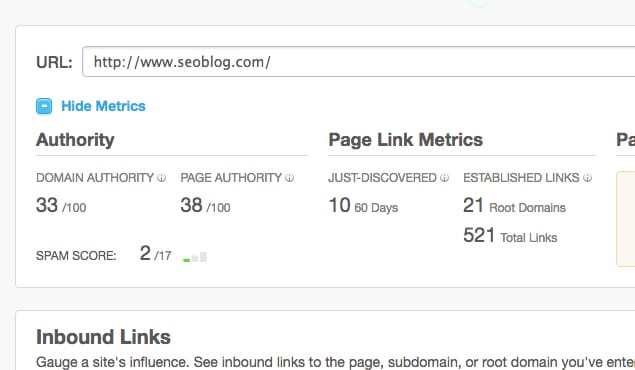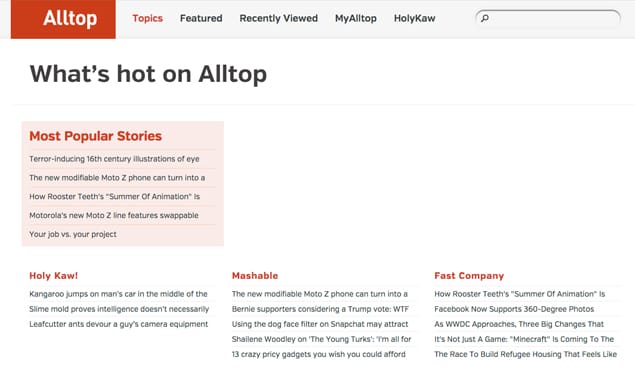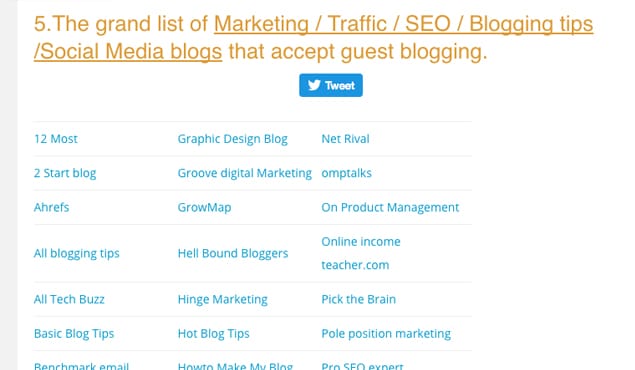The world of guest posting is one filled with hurdles. Everything from spammy sites to nofollow backlinks to long days waiting for responses from editors will get in the way of you actually publishing a piece on a website, let alone a well-respected and highly trafficked website.
Those hurdles won’t really go away, but they can become much smaller with a little research. That’s probably why you’ve landed at this article. It’s time to learn how to approach this guest post strategy smartly, so instead of working late hours into the night you can spend them writing the posts you want published.
Notice how those late-night hours are there no matter what? The truth is that in the beginning guest posting is not easy, and it will always take time.
I’ll assume you’re up for the challenge.
With that in mind, below you’ll find the ultimate guide to finding sites that accept guest posts. There are difficulties beyond finding the sites, but this is your first step to any successful guest post.
The Pre-Knowledge
This here is a little section to make sure we’re on the same guest post page. Before doing any of the steps below, you need to have a blog in a specific niche, have written a couple posts on that blog, and be ready to write more. That means lots of ideas.
Contacting blogs is going to be useless if you don’t have some ideas on tap, and nobody will respond to you if you don’t have a blog or writing samples in their niche. It’s the reality, and I know it might be a hard one.
Pull up a blank document. Write down your niche in 1-5 words. Go find the last 3-5 articles you wrote that are viewable online. Copy them into your document. This is what you will need to start sending guest post requests into the world.
Don’t have them? Get started on those two things, bookmark this article, and come back when you do.
Old-Fashioned Search
I’m starting with the old-fashioned search method because, no matter what, it will be the best way to find legitimate websites to write for. Before you roll your eyes and move on (what are you, a tween?), know that my suggestions below will make this search process faster, better, and more successful, but they are still based on those basic search principles.
If you’re already performing some of these methods, congratulations. I’m patting you on the back for being one step ahead. If you’re searching the annals of Google like a blind bat, it’s time to step into the light.
Keyword + “Write For Us”
This is the most basic method you should be using to find blogs that will accept your guest post. It’s very simple.
Use a keyword that is either the exact phrase of your niche or a keyword string that is something similar to your niche. This keyword is important. Make sure to spend time researching keywords and generating new ones. If you’re a good searcher you’ll not only use a number of excellent terms related to your expertise, but you’ll store them in a document for quick recollection.
After settling on a keyword, simply pull up Google and type it into the search bar. Then, after the keyword, put “Write For Us” in quotes, just like you see it written here. When you put something in quotes in a Google search it knows to search for that term verbatim. This effectively searches all of Google for your keyword and any site that has “Write for Us” in relation to your keyword.
Bam. The first two pages of Google should be full of websites that you can theoretically write for and are in your niche. You can keep scrolling past page 2, but you’ll start to get weird spammy sites that will probably never see the front page of Google.
Find the sites you like and are related to your niche, and email away.
Change “Write for us” to…
If you’re paying attention this one should be a no-brainer. Searching for the literal phrase “Write for Us” will make it so you only find sites that have that phrase. It turns out there are a lot of ways to say “Write for Us” in English in the modern world.
Other useful phrases to include in quotes after your keyword search term are:
- “guest post”
- “write for us”
- “contributor”
- “submission guidelines”
- “submit a post”
- “guest author”
- “accepting guest posts”
You can probably think of a dozen more. The reality is you’ll need to change both your quoted language and your keyword term fairly frequently to find new sites to write for.
Keyword + intitle:guest author
I know that poor grammatical phrase hurts your kind writer eyes, but suck it up, because this is a tried and true method of rooting out those more difficult to find blogs. Using an “intitle” tag in you search tells Google to only find websites that say, in this case, “guest author” in the title of an article.
Many smaller blogs do this frequently. I bet you’ve seen a post that says something like “Guest Author: How to Sleep for 3 Straight Days”. Typically not only the title of piece has Guest Author in it, but the URL does too.
Smaller blogs often don’t have specific pages just for guest posting guidelines, but they have guest posts all the time. This is a way to find those smaller blogs.
If you don’t see a page for submissions but see a number of guest posts, don’t hesitate to email the editor or main contact (use their name in your email!) and ask if they’d accept a contribution to you. That email should be a lot more formal, but that’s the gist.
You could expand this concept to other “inurl” phrases, like “Contributor” or “guest post.” Think of anything you’d see in the title of an article that might indicate a guest post.
Use Large Authors to Find Gust Post Opportunities
This method is much more complicated than old-fashioned search, but you’ll still end up searching Google with it. Basically, you want to identify key authors in your niche who write guest posts.
Do this first by searching a keyword that is specific to your niche but large enough to have plenty of articles online. Scroll through to find the authors of those articles.
First, note if the articles are on that author’s own website, or a different website. If it’s a different website, there’s another source you can submit your content to. This is true for most sites, but you’ll want to check out the site and see if they accept guest posts. They should, because this leading author wrote for them, but there are chances it was a special case for that author because they’re famous in their niche.
You can be like this soon, and it will never hurt to know what you’re aiming for.
Once you’ve collected 10 authors or so, do a Google search of those individual author names. For each author you search, check out their social profiles, portfolios, and bylines. Start to catalogue every place that the author has written.
Take all of those sites and find their submission pages, then email the editors. You know for sure that a guest author you aspire to be like has written on that site, so it becomes a tangible goal for you.
Use Other Search Engines
This may seem simple, but you’d be surprised how few people do it. Google isn’t the only search company around. If you really want to find some new sources, perform all of the above on Bing or Yahoo to get different results. You’d be amazed how many new websites this can give you.
Rank-Based Searches and Tools
With old-fashion search out of the way, another great method is to use sites that rank other sites, and to search the sites you love most. While this won’t be as effective as searching for sites that accept guest posts, you’ll get an idea of the highly-ranked sites on the internet, which will allow you to narrow your search if you’ve got a few you’re unsure about.
The last thing you want to do is write for a spam-based site. Google will eventually penalize the site, and your authorship will go down in flames with it. The old-fashioned search is great at pulling up websites, but these tools will help you check the legitimacy of them, and you might find a few new sites to write for in the process.
Domain Authority
Domain Authority (DA) is a tool developed by Moz (a site that takes guest posts, by the way). It is one key factor today in ranking a website’s influence on the web. The technical aspect of DA is quite complicated, but what you need to know is that every website is ranked on a 1-100 scale. The closer to 100, the more authority a website has.
You’ll want to check the DA of the sites you plan to write for to see if they are legitimate, or if they are worth your time. If you’re just starting out any site is worth your time (unless it’s a spam-site), so this is less important in that scenario.
Alexa Rankings
Alexa is another analytic service that has a well-respected ranking factor for websites. Similar to DA (but technologically different), this score also matters when it comes to a site’s respectability. Make sure to check both of these often.
AllTop
AllTop isn’t so much a ranking tool as a website that lists popular stories in a huge number of categories. This is a good research tool. Find your niche on AllTop and see what the most popular stories are today or in a given week.
This will provide you with ideas for articles, but it will also introduce you to new websites. You’d be surprised what it considers to be the “most popular.” Follow through the websites in your niche and see if they allow guest posts.
Search the Search Bar
You’re probably sick of the word search. Too bad! One of the things you can do after collecting a number of resources from a site like AllTop — or just your favorite blogs in your niche (because you have those, right?) — is to head to the blog itself and search the toolbar. Use “guest post” or “gust author” as your search times, but this time perform them in the blog itself.
This will dial down to any guest posts on that website quickly and easily.
Sites That List Guest Posting Sites
This is the last major way to find a heap of sites that take guest posts. Believe it or not, other people have tried to do all the hard work for you. There are a number of individual articles on sites that contain massive lists of guest post sites.
Just search “Sites that accept guest posts” to see them.
You think you’ve hit the holy grail, but most of your search results will actually be spam. You don’t want a list of 300+ terrible guest post sites, you just need 10-50 that are solid.
The rule of thumb for searching around these lists is to follow the URLs to a couple of recommended blogs. If they look legitimate, write them down. If they look sketchy, steer clear of the article completely.
It will probably be a tough call for some, as most of them are written with bad English and want you to click a bunch of times to get to the aforementioned guest post-accepting blogs. Don’t jump through hoops. If the article is legit, it will list them in plain view for you.
Note that even in Google’s Page 1 rankings, I found many spammy articles with links to poor blogs.
The best I’ve found is Web Marketing Saga’s Grand List of 386 Blogs that Accept Guest Blogging. At first I thought this would be total spam, but followed a couple of the sites through and found them to be legitimate. This list could be wrong for any number of blogs, or outdated in time. For now, it seems legit. Check it out.
Guestpost.com
Not to state the obvious, but the site you’re reading this article on is also a repository for blogs that accept guest posts. Guestpost.com includes ranking information with all of our listings and a full description of the blog, what it wants in a guest post, and the pitfalls associated with certain sites.
Last Minute Checks
It’s important to note here that every site you find in this way will need to be verified by you. Read through the site, its submissions page, its recent posts, and make sure it is legitimate. Check social feeds to see if the site gets shares on articles, if they have guest post authors that write for other publications, and what their whole concept is.
The last thing you want to do is to spend the time writing a guest post for it to appear on a bad website, or one that gets no traffic. Follow the tips above and you’ll find a huge amount of guest blogs to start emailing.
 ContentPowered.com
ContentPowered.com










